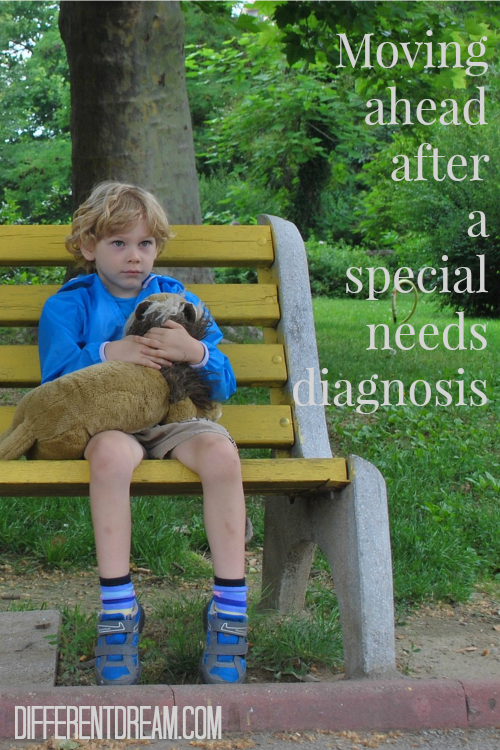
In yesterday’s post, Amy Stout described how broken she felt after she and her husband received a diagnosis for their young daughter: autism. Then, Amy shared bits and pieces of wisdom she and her husband have learned since that memorable day, things she wants to pass on to other parents embarking on the adventure of special needs.
Bits and Pieces of Wisdom, Part 2
- Look for and investigate supports. There are various supports for therapy, financial resources, education options, Medicaid, anxiety, electronics and etc. Don’t try to do it all on your own. Places to start would be your child’s doctor, area education agency, the social worker at the place where your child was diagnosed, Medicaid and the Department of Human Services. By FAR, the best resource you will find is other parents. Try joining blogging communities such as www.theblogfrog.com and searching for special needs groups or groups related to your situation. Join a support group, ask questions and speak up. Help is there if you will humble yourself and ask.
- Advocate for your child: None of us enjoy this part of the process, but it doesn’t always have to be difficult. Work on fostering care teams in your child’s school, church, and sport activities. Advocate and help search out funding to accommodate special equipment, activities or other supports your child will need.
- Be approachable. I know way too many families who experience special needs that have drawn a wall between themselves and the general public. None of us want to be hurt, but the best way to foster relationships is to be open and honest with those who are willing to step into our lives. I especially love it when a friend will say “I have no idea what you are going through, but I would really love it if you would teach me about it and tell me ways that I can be there for you and help support your family” – What a GIFT!!
- Find a safe place – whether on paper, to your spouse or best friend where you can vent openly and not damage a relationship. Make sure that if it is a person, it is someone who can help you get out of the funk and back into a positive mindset.
- Take care of yourself. This is an area that I am not proficient in, so I am standing on the platform preaching to the choir. Get enough rest, eat balanced meals, exercise, take a time out when you need to, ask for help, foster social and spiritual relationships. Try to have balance in your life between school, church, therapy, family responsibility and fun.
- Try not to be concerned with what others think (this is also a difficult one for me). If your child needs a safety harness to navigate pedestrian traffic, then use it (even if a woman in Parents Magazine said using a safety harness is lazy parenting. I’d like to see them parent a special needs child for just one day). Your priority is to your child and family. Do whatever is necessary to meet your child’s safety (and other) needs.
- Empower your child by giving them the tools they need to be successful in the community. When speech therapy taught our daughter to say “I want book”, we taught her to say “I want book PLEASE.” When they transitioned to “Can I have book”, we taught her “MAY I have book, PLEASE” (proper grammar and polite/less demanding to casual observers).
- Express Gratitude: Be sure to write thank you notes, or express gratitude verbally to your child’s caregivers, teachers and helpers. Praise service providers and other people who have stepped into your life. Provide good, honest and constructive feedback when you are asked to (or when you feel it is necessary), but always balance it with positive and thankful experiences.
- LIVE: Turn off your computer, close the library book, put away the therapy tools and gather your family around you. Make a bucket list of things you would like to experience together or learn about together over the summer. Then DO those things and take pictures. The best way to bond as a family is to have shared experiences. The best way to have others feel connected to your family is to share these things with them (via caring bridge, a blog, a photo album, hearing your stories)… Again… they will take their cue from you and emerge more educated and supportive of your future endeavors.
- Invest in your spouse and your child. Don’t allow your lives to focus on the disability. Enjoy each other’s company, make memories, find out what each is good at and encourage that area. Really listen and hear what they say, how they feel, and what they think about things.
- LOVE your family: Say it, write it, demonstrate it in your touch. Date your spouse. Date your kids. Express pride (in front of them so they can hear). Meet their needs before they surface, remember special dates, surprise them with the occasional gift or favorite meal.
“…I think,” concluded Anne, hitting on a very vital truth,
“that we always love best the people who need us.”
— L.M. Montgomery (Anne of Avonlea)
Final Advice
- Rest assured that your life will be as fun, complete and whole as it is supposed to be. Different is better than ordinary if you are willing to embrace it and experience it.
- YOU CAN DO IT. God gives each of us the tools, personalities and gifts to navigate these special highways in life. We were chosen for a special purpose and He has a perfect plan for our future.
- If anyone reading this has any questions or would like more detailed information as to resources available, I would be happy to answer any questions or give further information. I don’t have all the answers but I could point you in the right direction and share with you what has worked for my family.
Some people go through life trying to find out what the world holds for them
only to find out too late that it’s what they bring to the world that really counts.
— L.M. Montgomery (A Stepping Stone Book)
Add Your Bits and Pieces of Wisdom
Thanks again Amy for sharing your wonderful advice. Readers, if you have bits and pieces of wisdom to share with other families who recently received a special needs diagnosis for their children, please leave a comment.
Do you like what you see at DifferentDream.com? You can receive more great content by subscribing to the quarterly Different Dream newsletter and signing up for the daily RSS feed delivered to your email inbox. You can sign up for the first in the pop up box and the second at the bottom of this page.



